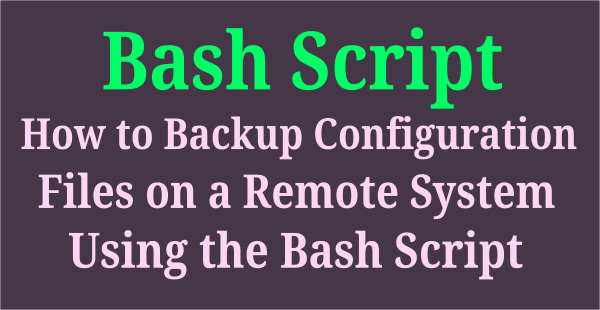Sending email from the command line is required when you need to create emails from a shell script.
There are several commands on Linux to send emails from the Linux command line.
I’ve included the Top 6 Command Line Mail Clients in this tutorial.
You can use any one of the following to send email from the Linux command line.
This can be done using the following six commands.
- mailx
- mutt
- mpack
- sendmail
- ssmtp
How does it work?
Let me give you an overall explanation of how the mail command delivers the mails to recipients on Linux.
The mail command compose emails and sends them to a local mail transfer agent (MTA), such as sendmail, postfix, and so on.
The mail server actually communicates with remote mail servers for sending and receiving emails.
The flow chart below can explain more about that.
1) How to Install mail Command on Linux
The mail command is most popular command to send emails from Linux terminal.
The mail command can be installed from the distribution official repository as follows.
For “Debian/Ubuntu” systems, use APT-GET Command or APT Command to install mailutils.
$ sudo apt-get install mailutils
For “RHEL/CentOS” systems, use YUM Command to install mailx.
$ sudo yum install mailx
For “Fedora” system, use the DNF Command to install mailx.
$ sudo dnf install mailx
1a) How to Use mail Command on Linux to Send a Mail
It’s straightforward and easy to use.
Use the following format to send mail using the mail command without an attachment.
$ echo "This is the mail body" | mail -s "Subject" daygeek@gmail.com
Use the following format to send mail using the mail command with attachment.
$ echo "This is the mail body" | mail -a test1.txt -s "Subject" daygeek@gmail.com
+---------+----------------------------------------------------+ | Options | Description | +---------+----------------------------------------------------+ | -a | It's used for attachment on Red Hat based systems. | | -A | It's used for attachment on Debian based systems. | | -s | Specify the subject of the message | +--------------------------------------------------------------+
2) How to Install mutt Command on Linux
The mutt is another popular command to send emails from Linux terminal.
Mutt is a small but very powerful text based program for reading and sending electronic mail under unix operating systems, including support for color terminals, MIME, OpenPGP, and a threaded sorting mode.
The mail command can be installed from the distribution official repository as follows.
For “Debian/Ubuntu” systems, use APT-GET Command or APT Command to install mutt.
$ sudo apt-get install mutt
For “RHEL/CentOS” systems, use YUM Command to install mutt.
$ sudo yum install mutt
For “Fedora” system, use the DNF Command to install mutt.
$ sudo dnf install mutt
2b) How to Use mutt Command on Linux to Send a Mail
This is also straightforward and easy to use.
Use the following format to send mail using the mutt command without an attachment.
$ echo "This is the mail body" | mutt -s "Subject" daygeek@gmail.com
Use the following format to send mail using the mutt command with attachment.
$ echo "This is the mail body" | mutt -s "Subject" daygeek@gmail.com -a test1.txt
3) How to Install mpack Command on Linux
The mpack is another popular command to send emails from Linux terminal.
The mpack program encodes the the named file in one or more MIME messages. The resulting messages are mailed to one or more recipients.
The mpack command can be installed from the distribution official repository as follows.
For “Debian/Ubuntu” systems, use APT-GET Command or APT Command to install mpack.
$ sudo apt-get install mpack
For “RHEL/CentOS” systems, use YUM Command to install mpack.
$ sudo yum install mpack
For “Fedora” system, use the DNF Command to install mpack.
$ sudo dnf install mpack
3a) How to Use mpack Command on Linux to Send a Mail
This is also straight forward and easy to use.
Use the following format to send mail using the mpack command without an attachment.
$ echo "This is the mail body" | mpack -s "Subject" daygeek@gmail.com
Use the following format to send mail using the mpack command with attachment.
$ echo "This is the mail body" | mpack -s "Subject" daygeek@gmail.com -a test1.txt
4) How to Install mail Command on Linux
Mailx is the newer version of mail command.
It is based on Berkeley Mail 8.1, is intended to provide the functionality of the POSIX mailx command, and offers extensions for MIME, IMAP, POP3, SMTP, and S/MIME.
Mailx provides enhanced features for interactive use, such as caching message threading, scoring, and filtering.
The mailx command can be installed from the distribution official repository as follows.
For “Debian/Ubuntu” systems, use APT-GET Command or APT Command to install mailutils.
$ sudo apt-get install mailutils
For “RHEL/CentOS” systems, use YUM Command to install mailx.
$ sudo yum install mailx
For “Fedora” system, use the DNF Command to install mailx.
$ sudo dnf install mailx
4a) How to Use mailx Command on Linux to Send a Mail
It’s straight forward and easy to use.
Use the following format to send mail using the mailx command without an attachment.
$ echo "This is the mail body" | mail -s "Subject" daygeek@gmail.com
Use the following format to send mail using the mailx command with attachment.
$ echo "This is the mail body" | mail -a test1.txt -s "Subject" daygeek@gmail.com
5) How to Install sendmail Command on Linux
Sendmail is a most popular and general purpose SMTP server used in most of Linux distribution.
Also, it allows you to sending email from command line.
The sendmail command can be installed from the distribution official repository as follows.
For “Debian/Ubuntu” systems, use APT-GET Command or APT Command to install sendmail.
$ sudo apt-get install sendmail
For “RHEL/CentOS” systems, use YUM Command to install sendmail.
$ sudo yum install sendmail
For “Fedora” system, use the DNF Command to install sendmail.
$ sudo dnf install sendmail
5a) How to Use sendmail Command on Linux to Send a Mail
It’s straight forward and easy to use.
Use the following format to send mail using the sendmail command.
$ echo -e "Subject: Test Mail\nThis is the mail body" > /tmp/send-mail.txt
$ sendmail daygeek@gmail.com < send-mail.txt
6) How to Install ssmtp Command on Linux
ssmtp is a send-only sendmail emulator for machines which delivers email from a local computer to a configured mailhost (mailhub).
SSMTP allows users to transfer emails through an SMTP server from the Linux command line.
The sendmail command can be installed from the distribution official repository as follows.
For “Debian/Ubuntu” systems, use APT-GET Command or APT Command to install ssmtp.
$ sudo apt-get install ssmtp
For “RHEL/CentOS” systems, use YUM Command to install ssmtp.
$ sudo yum install ssmtp
For “Fedora” system, use the DNF Command to install ssmtp.
$ sudo dnf install ssmtp
6a) How to Use ssmtp Command on Linux to Send a Mail
It’s straight forward and easy to use.
Use the following format to send mail using the ssmtp command.
$ echo -e "Subject: Test Mail\nThis is the mail body" > /tmp/ssmtp-mail.txt
$ ssmtp daygeek@gmail.com < /tmp/ssmtp-mail.txt




